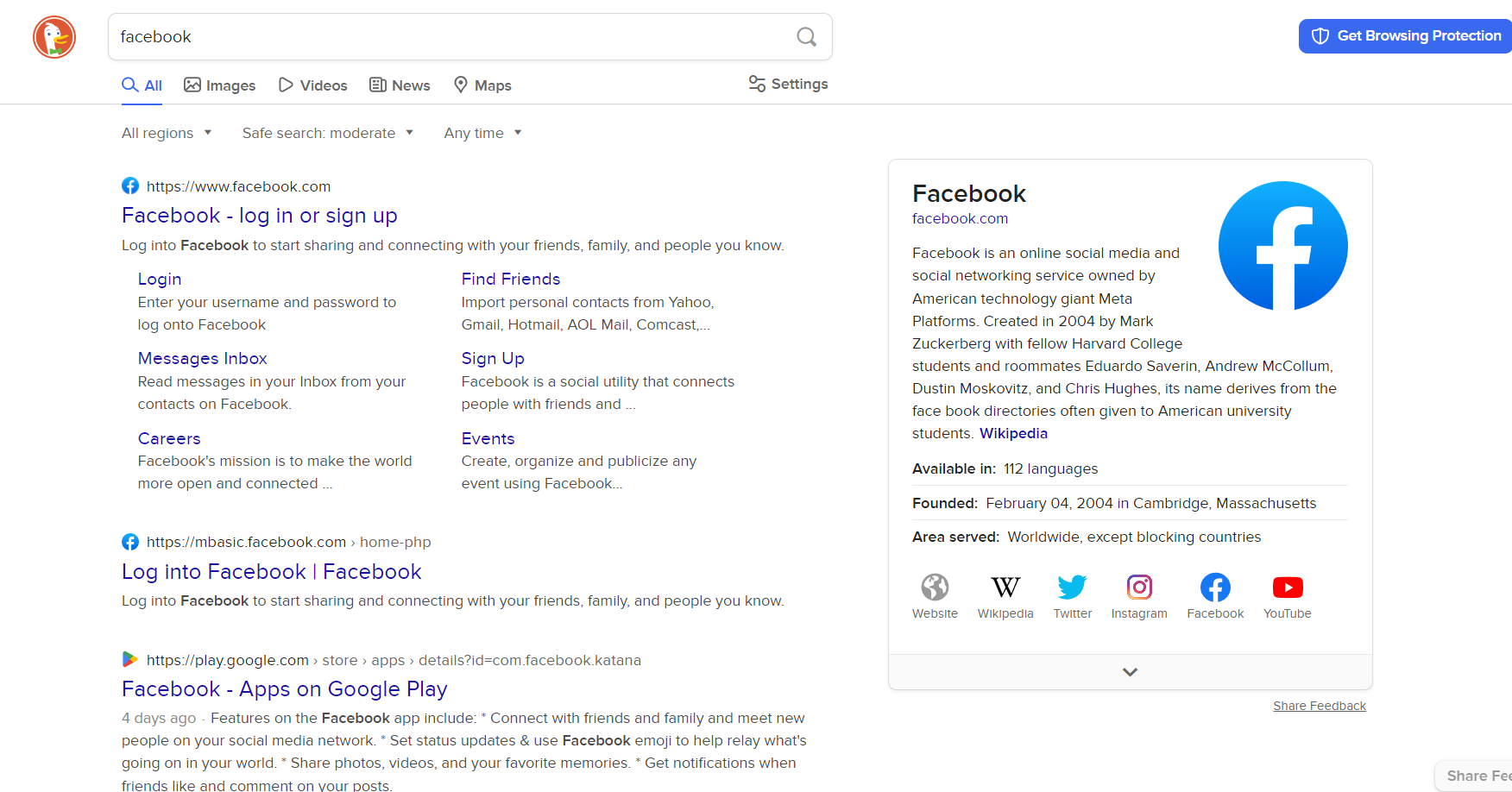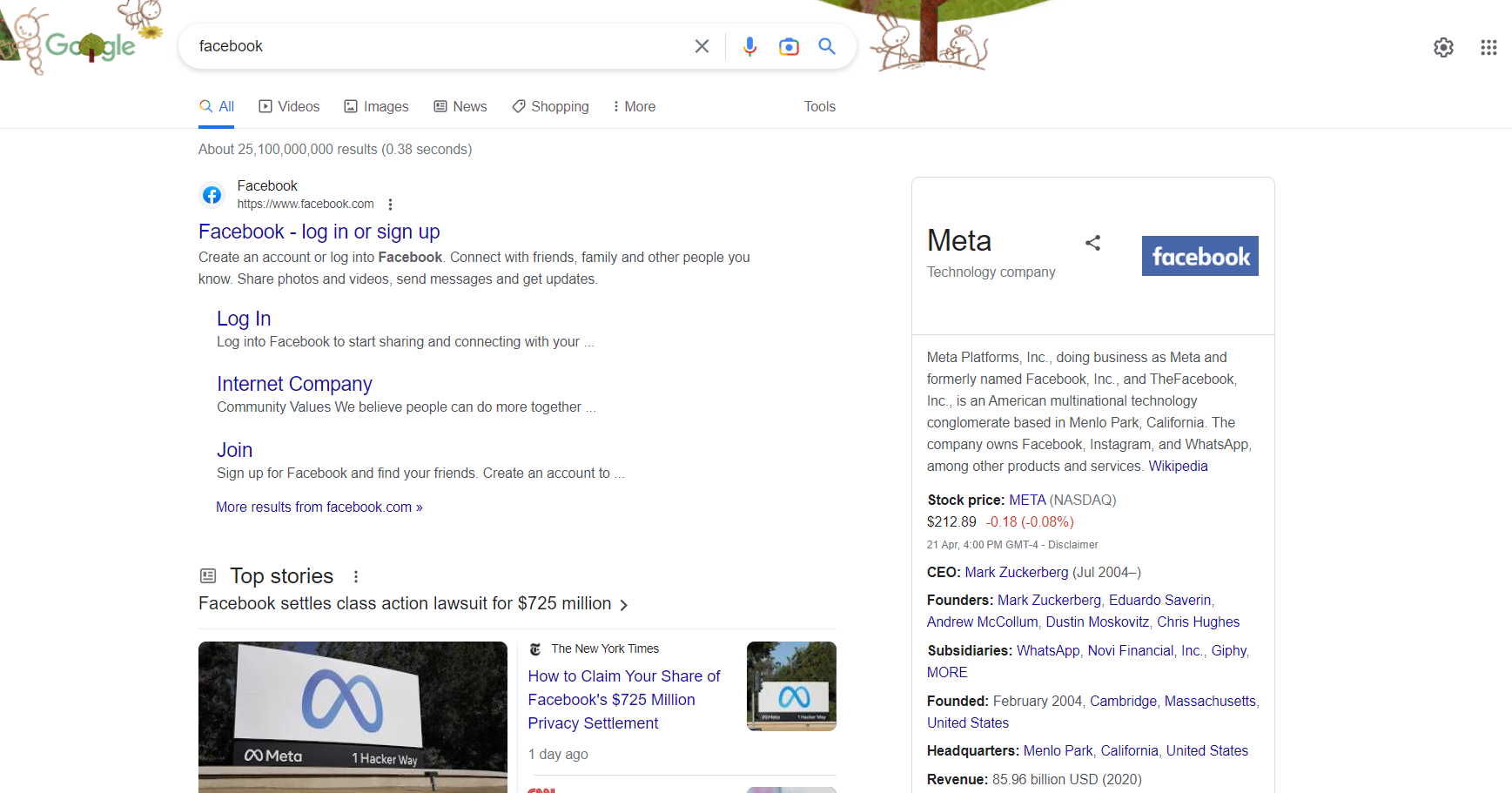We all know that Google’s business model is built around tracking our searches and customizing ads. But for a privacy conscious consumer like yourself, it’s hard to know how worrisome this really is and what power we have to fight it.
Google is constantly running experiments and updating the search algorithm to improve it on a daily basis. I tell you all this because when you’re weighing the difference between using Google and DuckDuckGo, the two variables we’re messing with here are privacy and search quality.

DuckDuckGo is a excellent search engine. I’m simply pointing out that Google search quality is influenced in no small part by the information it collects from you. DuckDuckGo’s privacy policy, on the other hand, guarantees that they won’t have this same advantage.
Google tracks your movement across the internet. While DuckDuckGo actively blocks this kind of tracking, from Google, Facebook and others.
It’s estimated that Google has more than 90% of global search market share, while DuckDuckGo has less than 1%. Google offers personalized search results.
Google vs DuckDuckGo: The True Nature of Their Business Models
When Google was founded in 1998, it was the only search engine available. As the company grew, so did its market share, and by 2003, Google had become the world’s most popular search engine. In 2007, Google made a move into the online advertising market with the acquisition of DoubleClick. This deal gave Google access to data on how users searched and what ads to show them. The purchase also gave Google a strong hold on the online advertising market.
In 2013, Google made another move into the online advertising market with the acquisition of Motorola Mobility. This purchase gave Google access to the hardware used to create mobile apps. Google then used this information to create its own mobile apps and services. This purchase also gave Google a strong hold on the mobile device market.
DuckDuckGo was founded in 2008 by Gabriel Weinberg and Michael Weinberg. DuckDuckGo is a search engine that does not collect any user data.
DuckDuckGo as a Search Engine
 Image: DuckDuckGo Search Bar
Image: DuckDuckGo Search Bar
Have you ever considered how search engines track your every move and collect your data? DuckDuckGo is a search engine that addresses this concern by prioritizing user privacy. Founded in 2008, DuckDuckGo is on a mission to provide a search engine that does not collect any personal information from its users and does not track their search queries.
 Image: DuckDuckGo SERP Page
Image: DuckDuckGo SERP Page
When you use DuckDuckGo to search the web, your search queries are not tied to your identity or used to build a profile of your interests and behaviour. Unlike other search engines like Google, DuckDuckGo promises not to track users, not collect or store personal information, and not use any third-party trackers or cookies. This means that you can feel safe and secure while browsing the internet.
DuckDuckGo has a clean and straightforward interface that makes it easy to use. Its search results pages are designed to provide relevant and valuable information without distracting ads or clutter. The search engine offers several features, including instant answers, image search, and video search, which can be accessed directly from the search results page.
However, one thing to remember is that because DuckDuckGo focuses on user privacy, it may not provide as comprehensive or relevant search results as other search engines like Google. This is because it does not have the same amount of data on its users and their behaviour and does not have access to the same amount of web pages and content as Google’s index. But you prioritize privacy over the potential benefits of personalized search results. In that case, DuckDuckGo can be an excellent choice for you.
Pros and Cons of DuckDuckGo
Pros of Using DuckDuckGo
- Privacy: One of the most significant benefits of using DuckDuckGo is the emphasis on user privacy. Unlike other search engines that collect and store user data, DuckDuckGo does not track your online activity or use your personal information to target ads.
- No filter bubble: Another advantage of using DuckDuckGo is the lack of a “filter bubble.” This means the search results you see are not tailored to your previous search history or personal preferences, which can help you discover new and diverse content.
- Simplicity: DuckDuckGo has a clean and straightforward interface that is easy to navigate, with no distracting ads or clutter.
- Instant answers: DuckDuckGo provides instant answers to queries. You can quickly find the information you need without clicking through multiple links.
- Limited search results: One of the main drawbacks of using DuckDuckGo is that it may provide fewer search results or as comprehensive results as other search engines like Google. This is because DuckDuckGo collects fewer data on its users and their behaviour. Therefore, it may access more web pages and content than Google’s index.
- Limited features: DuckDuckGo offers fewer features than other search engines like Google, such as voice search, image recognition, or personalized search results.
- Learning curve: If you are used to using other search engines like Google, it may take some time to adjust to the different search algorithms and features of DuckDuckGo.
- Limited availability: While DuckDuckGo is available as a search engine in many countries, it may not be as widely used or recognized as other search engines, making it harder to find relevant information in certain regions.
- Fast and Accurate Results: Google is known for providing fast and accurate results to its users. Its complex algorithms consider various factors to deliver the most relevant results to the user’s query.
- Wide Range of Services: In addition to its search engine, Google offers a range of other services such as Gmail, Google Drive, Google Maps, and more. These services are all designed to make users’ online experiences more convenient and efficient.
- User-Friendly Interface: Google’s interface is simple and easy to use. It’s designed to make it easy for users to find what they’re looking for quickly and easily.
- Regular Updates: Google constantly updates its search algorithm to improve accuracy and relevance. This means users are more likely to find what they want when using Google.
- Privacy Concerns: Google has been criticized for collecting user data and using it for targeted advertising. While the company has tried to address these concerns, some users may still be uncomfortable with the amount of data that Google collects.
- Bias: Like any search engine, Google is biased towards certain websites and content. This means some information may be buried or difficult to find while others may be prioritized.
- Limited Search Options: While Google is great for general searches, there may be better options for more specialized searches. For example, other search engines may be more suitable if you’re looking for academic research or niche information.
- Dependence on Advertising: Google heavily relies on advertising revenue, meaning that advertising dollars may influence search results.
- Google has long been known for its search engine capabilities. DuckDuckGo, on the other hand, has made a name for itself by focusing on privacy and security.
- Google is well-known for its tracking and collecting of user data. DuckDuckGo, on the other hand, does not track its users’ data at all. DuckDuckGo also doesn’t have any tracking features focused on advertisements.
- Google is known for its ability to store user data across different platforms. DuckDuckGo, on the other hand, stores only user data within its own platform. This allows DuckDuckGo to have complete control over user data.
- Google has a long history of sharing user data with third-party companies. DuckDuckGo does not share user data with any third-party companies.
- Google has its own browser named Google Chrome is in the list of most secure browsers.
Cons of Using DuckDuckGo
Google as a Search Engine
 Image: Google Search Bar
Image: Google Search Bar
Google is one of the most popular search engines used by people worldwide. It was founded in 1998 by Larry Page and Sergey Brin while they were studying at Stanford University. Today, Google is part of Alphabet Inc., one of the world’s largest tech companies.
Google has a massive index of web pages and uses an algorithm to provide users with the most relevant search results. It also offers Gmail, Google Drive, Google Maps, and more services.
Google’s search engine is known for its speed and accuracy. It uses complex algorithms that consider factors such as keyword relevance, website quality, user experience, and more to deliver the best possible results.
Google’s search engine is also constantly evolving. The company regularly releases updates and changes to its algorithm to ensure users get the best possible experience. Some of these updates include the Panda update, which aimed to reduce the ranking of low-quality sites, and the Hummingbird update, which focused on improving the accuracy of long-tail keyword searches.
 Image: Google SERP Page
Image: Google SERP Page
Google’s search engine has become so popular that it has become a verb in its own right. When people want to search for something online, they often say, “I’ll Google it” instead of “I’ll search for it online.”
Despite its popularity, there are some concerns about Google’s search engine. One of the biggest concerns is privacy. Google has been criticized for collecting user data and using it for targeted advertising. However, the company has addressed these concerns by allowing users to control their privacy settings and offering services like Google’s incognito mode.
Pros and Cons of Google
Pros of Using Google
Cons of Using Google
In Short: Privacy and Security
Overall, Google is well-known for its tracking abilities and its ability to store user data.
Google or DuckDuckGo: Which Search Engine Should You Use?
Google is the best search engine for determining information. It has an index of millions of documents, which makes it the best choice for finding the information you are looking for.
Different search engines have different advantages based on the information that they collect about your website.
There are various different search engines available on the internet, and each one has its own advantages in terms of the information it collects about a website. For example, Google collects a lot of data about the websites that are ranking in its search engine, and this information can be used to improve the ranking of a website in Google’s search engine results pages (SERPs). In contrast, Yahoo! only collects data about the websites that are ranking in its front page, and this information is not as useful for improving a website’s ranking in Yahoo!’s SERPs. Also, there are some private search engines available on the internet like DuckDuckGo, Startpage..etc.
DuckDuckGo has strived to offer a superior user experience when searching the internet. This focus has led the company to build a platform that relies on search engine algorithms that are designed to produce more accurate results. DuckDuckGo’s goal is to provide users with the best search results possible, regardless of the website.
DuckDuckGo has been able to achieve this goal by implementing several different search engine optimizations. These include using a minimalist user interface, focusing on accurate results, and reducing the number of advertisements. Additionally, DuckDuckGo has made it a priority to protect users’ privacy. This includes encrypting search data and not tracking user behavior.
All of these efforts have led to DuckDuckGo becoming one of the most popular search engines on the internet. While there are some competitor search engines, DuckDuckGo’s superior platform and user experience makes it the clear choice for users looking for the best results.
Conclusion
When it comes to privacy, Google and DuckDuckGo are both pretty good options. Both services offer encrypted search, private browsing (which deletes all history and cookies when you close your browser), and a variety of other features to help protect your privacy.
However, there are a few differences between the two services. DuckDuckGo is more focused on privacy than Google, with a focus on giving users more control over their data. For example, DuckDuckGo doesn’t store user data in search results, so it can’t track your activity across different websites. Google, on the other hand, gathers a lot of data about users, including search history and browsing habits.
Alby Abraham is an technology enthusiast, published blogger, and a content marketer who spends his time on building a career in the digital marketing industry. He also writes a blog on The Last Words for tech lovers.
